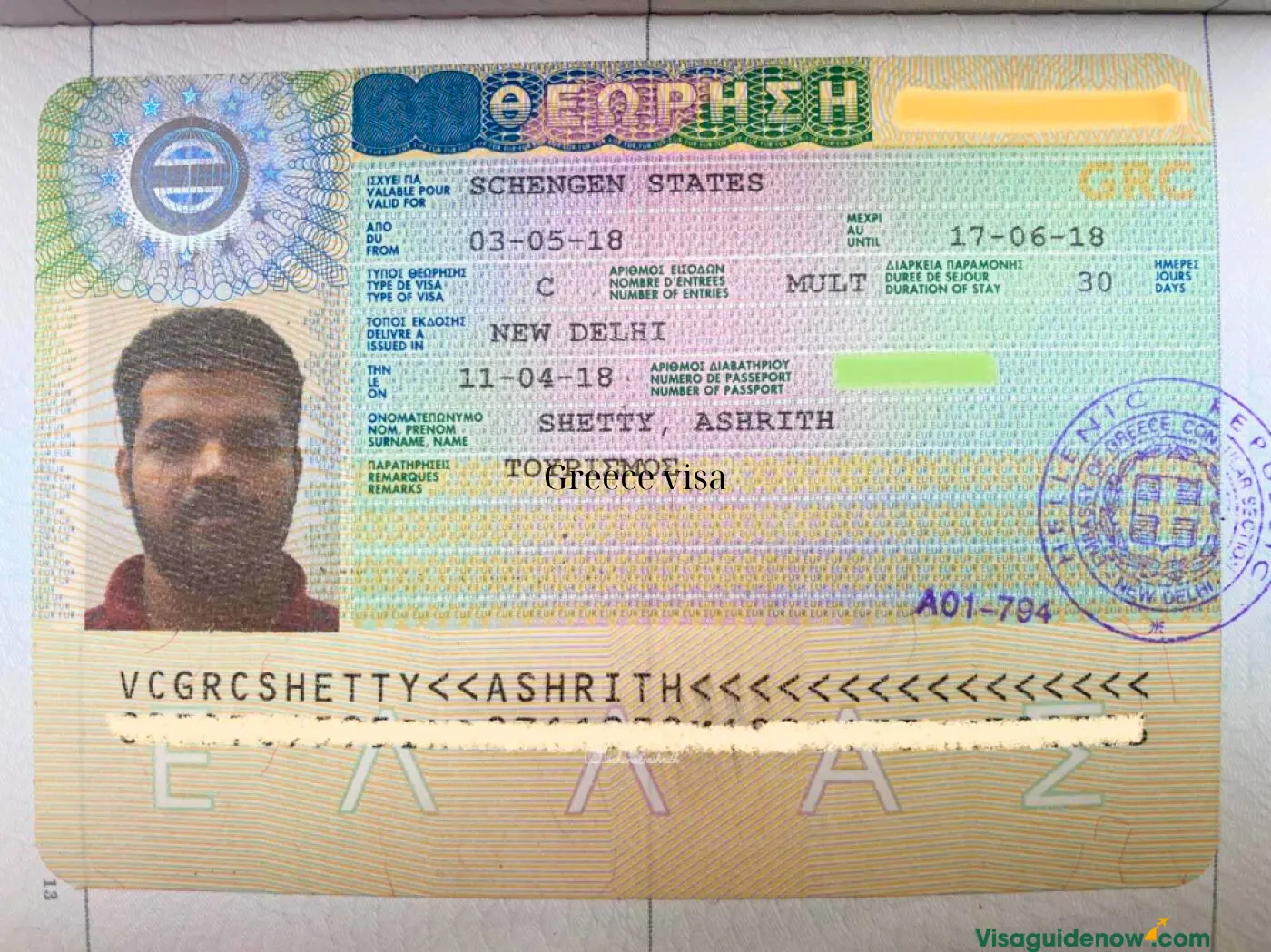Greece Visa Types, Requirements, and Application
A Greece visa serves as permission for individuals to enter the country and stay for a specific duration. This process encompasses various procedures, the collection of specific documents, and the payment of associated fees. Here’s a comprehensive guide to everything you need to know about obtaining a Greece visa.
Who need a visa to Greece?
- The Schengen agreement allows citizens of specific countries to visit Greece for 90 days without a visa. These countries include:
- Furthermore, citizens from the following countries enjoy agreements with Schengen member states, allowing visa-free entry for tourism or business purposes. This allows stays of up to 90 days in any 180-day period.
On the contrary, if you are a citizen of countries not mentioned above, you will have to apply for a visa before arriving in Greece.
Greece visa types
Schengen visas
The Schengen area represents a zone of free movement established by many European Union member states, allowing unrestricted travel within its boundaries. The Schengen visa, valid for up to 90 days, facilitates travel for tourism or business purposes within this area.
Here are some different types of Schengen visa:
Airport transit visa
- Designed for travelers changing flights at a Schengen airport.
- Permits waiting in the international transit area for the onward flight.
Business visa
- For those intending to conduct business within the Schengen area.
- Typically valid for stays of up to 90 days.
Tourist visa
- Granted to non-EU citizens visiting Schengen areas for tourism, with stays not exceeding 90 days.
Visitor visa
- Required for non-EU citizens visiting family, relatives, or friends in Schengen states.
- A mandatory letter of invitation is needed.
- Allows a stay of up to 90 days within a 6-month period.
Schengen medical treatment visa
- Allows the holder to receive medical treatment in a Schengen state for up to 90 days.
- Requires a local health check statement and confirmation from a Greek hospital.

Greece category D visa
Study, training, research, or internship visa
- For those from other countries wanting to study in Greece.
- Need enrollment certificate and proof of financial support.
- Allows applying for residence if staying over 90 days.
Employment visa
- Non-EU citizens eligible to work in Greece.
- Requires a job offer, bank statement (last 6 months), and employer’s leave approval.
Visa for spouse of a Greek citizen
- Needs Greek marriage certificate, family record book, and proof of nationality.
Visa for under-age children
- Requires parent’s income proof and notarized travel permission.
- If one parent lives abroad, notarized parental travel permission is needed.
Greece visa requirements
When applying for a Greece visa, it’s highly likely that you’ll need to provide important documents. Typically, these requested documents serve to verify your identity, confirm the legitimacy of your travel purpose, and evaluate your financial standing. The specific type of visa you’re applying for will dictate the supplementary papers required. These may encompass:
- Passport: An official government document, not exceeding 10 years, valid for at least three months beyond the planned departure from Greece.
- Personal photos: Provide two recent passport-style photos of the applicant, adhering to passport dimensions.
- Biographical records: Identity documents like your birth certificate.
- Financial documentation: Papers showcasing your financial status, such as your bank balance.
- Accommodation details: Information about your intended stay location in Greece.
- Educational records: Evidence of your university education, among other educational materials.
- Proof of medical insurance: Documents proving the individual is covered under the insurance program.
How to apply for Greece visa?
- Step#1. Prepare your visa application: To begin the process of applying for a Greek visa, applicants should follow a set of general steps. It’s worth noting that the specific requirements may vary based on factors such as the type of visa and the destination of the application.
- Step#2. Choose your visa duration: Firstly, determine the duration of your stay in Greece. Depending on whether you plan a short or long visit or just a layover at the airport, you’ll need to select the appropriate visa type. After that, you can choose the purpose of your travel, whether it’s for work, study, or another reason.
- Step#3. Select your entry category: Decide on the entry category that suits your travel needs – single-entry or multiple-entry visa. Keep in mind that holders of a single-entry visa for Greece cannot re-enter the country once they exit.
- Step#4. Determine your application destination: Identify the physical location for submitting your application, which could be the Greek Embassy/Consulate or a designated visa application center in your area. For more details, refer to “where to apply.”
- Step#5. Fill out your visa application: While there isn’t an online Greece visa application system, long-term visa applicants can download the application form. For Schengen visa seekers, the universal Schengen visa form should be printed.
- Step#6. Schedule your Greek visa interview: To initiate the Greece visa application process, applicants are required to book a visa interview at their designated application location, be it the local Greek embassy, consulate, or visa application center. The scheduling process may vary in duration, ranging from days to potentially weeks or months. To secure your appointment, reach out directly to the embassy, consulate, or visa application center through email or phone communication.
- Step#7. Attend your visa interview: The visa interview marks a crucial step in the Greek visa application journey. During this session, applicants will provide their biometric information, undergo an interview, settle Greek visa fees, and fulfill other requisites based on their visa category. Typically, this phase represents the final stage of the Greece visa application process. At the end of your appointment, you can expect one of three outcomes: visa approval, rejection, or awaiting a decision.

Greece short-stay visa fees
For those seeking a Greece Schengen visa, the fees vary based on age:
- €80 for adults.
- €40 for children aged six to twelve.
- Children under six are not required to pay any fee.
It’s important to note that certain applicants are exempt from this fee due to the Schengen visa code. These include:
- Family members of EU/EEA and Swiss citizens.
- School pupils, students, post-graduate students, and accompanying teachers on educational stays.
- Researchers from third countries engaged in scientific research travel.
- Representatives of non-profit organizations aged 25 or younger participating in events organized by such organizations.
- Holders of diplomatic and service passports.
Greece long-stay visa fees
Navigating the fees for long-stay visas in Greece involves a bit more detail, thanks to varying amounts for different categories. While the standard national visa fee remains at 180 euros, distinctions arise, as outlined below.
A reduced fee of €90 is applicable for:
- Students currently enrolled at a Greek university.
- Individuals entering Greece under EU Directives, encompassing studies, pupil exchange, unpaid traineeships, voluntary service, family reunion, and scientific research.
- Scholars engaged in specific exchange programs outlined in bilateral agreements or those co-financed by the European Union.
Applicants falling into the subsequent categories are required to pay a €75 fee for visa processing:
- Those seeking seasonal employment, including agreements with Albania lasting up to six months and Egyptian fish workers with an 11-month duration.
- Members of artistic groups applying for stays of up to 1 year.
- Third-country nationals journeying from an EU/EEA-established enterprise, aiming to provide services under a procurement contract signed between said enterprise and a corresponding entity in Greece, with stays of 6 months or 1 year.
